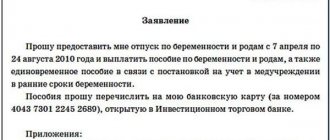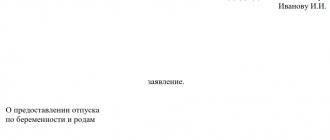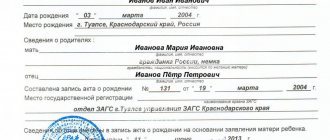In accordance with the national project “Health,” a program for issuing birth certificates began to operate in 2006. The purpose of the program is to increase the financial interest of medical institutions in providing quality medical care to expectant mothers. It becomes profitable for health workers to register more pregnant women. There is also an expectation to reduce the number of abortions, since consultation workers have an incentive to dissuade a woman from terminating her pregnancy in order to get another “client”. In addition, birth certificates will provide a pregnant woman with the opportunity to choose an antenatal clinic, where she expects to register and be monitored for pregnancy, and in the future, a maternity hospital.
What is a birth certificate?
Young mothers receive a birth certificate
when taking out maternity leave for a pregnancy of 30 weeks or more (28 weeks for multiple pregnancies). The birth certificate consists of three coupons:
- Coupon No. 1, denomination 3,000 rubles. Used to pay for services provided to women by health care institutions during pregnancy at the outpatient clinic stage (antenatal clinics);
- Coupon No. 2, denomination 6,000 rubles. Used to pay for services provided to women in maternity hospitals (departments), perinatal centers;
- Coupon No. 3 (since 2007), denomination 2,000 rubles. Used to pay for the services of a children's clinic for dispensary observation of a child in the first year of life (1,000 rubles per six months).
Birth certificate amount
The full cost of the birth certificate is 11,000 rubles. This amount is paid from the federal budget. Most of the funds are allocated to wages for the staff of antenatal clinics and maternity hospitals. If a woman was observed in a antenatal clinic on a paid basis, then at the antenatal clinic at her place of residence she will be given a birth certificate, on which coupon No. 1 will be stamped “not subject to payment.” Also, with the canceled coupon No. 1, they will issue a birth certificate if the woman did not receive it before giving birth. The situation is similar in the maternity hospital - if a woman has entered into an agreement with the maternity hospital to receive paid services, then coupon No. 2 of the birth certificate will be canceled. The mothers themselves give the coupons to medical workers. If the quality of care provided was unsatisfactory, the woman has the right to contact the health authorities. If a woman is observed in several consultations during pregnancy, coupon No. 1 of the birth certificate is given to the antenatal clinic that has observed the pregnant woman for the longest time. At the same time, the total period of pregnancy management in antenatal clinics must be at least 12 weeks. Having a birth certificate in hand, you can use the services of any government medical institution, i.e. choose any government
antenatal clinics, maternity hospital and children's clinic.
Birth certificate for the first or second child
The birth certificate for the second child is exactly the same as for the first child, there are no differences
. When receiving a birth certificate for a second child, you must follow the same basic rules:
- Observe in the antenatal clinic for at least 12 weeks, only after this period a certificate is issued.
- If you do not show up for three months after registration, problems may arise with obtaining a birth certificate.
- For everyone who uses paid services, you cannot pay for them with a birth certificate!
It is impossible to receive cash payments for a birth certificate; it is intended solely to pay for services to a medical institution.
Birth certificate in questions and answers
Is it possible to issue a birth certificate to citizens of the Russian Federation who do not have documents confirming registration at their place of residence?
The presence of registration at the place of residence does not affect the right to receive a birth certificate and a woman has the right to seek help from any healthcare institution in the Russian Federation.
Is it possible to obtain a Birth Certificate for a woman who does not have a compulsory medical insurance policy or SNILS?
If a woman does not have a compulsory medical insurance policy or SNILS, she must be given a birth certificate, but the certificate must include a note indicating the reason for the absence of the above documents. For example, women working in the Ministry of Internal Affairs and the Ministry of Defense of Russia are not subject to compulsory health insurance and do not have a compulsory medical insurance policy.
What document should a woman under 14 years of age present if she is pregnant?
In this case, a birth certificate can be issued by an antenatal clinic on the basis of a birth certificate. If after reading the article you still have additional questions, or you want to understand the controversial situation, you can independently familiarize yourself with the regulatory document: Order No. 370n dated July 16, 2014. The rules for obtaining a birth certificate are specified in paragraphs 6 and 7 of the order.
Pay attention to child benefits, which are established by Federal Law No. 81-FZ “On State Benefits for Citizens with Children”
From February 2021, the amount of a one-time benefit for women registered in the early stages of pregnancy is 649.84 rubles. To receive benefits you must
Future mothers are often unsure that the medical care provided during pregnancy and childbirth will be at the proper level. However, you should know: the necessary medical assistance is still provided within the framework of the “Health” national project. There is a completely solvent state instrument: a birth certificate. Let's try to find out what it is.
What is a birth certificate
A birth certificate is a document issued to a woman within the framework of the Health project at 30 weeks of pregnancy (if there are more than two fetuses - at 28 weeks).
Its main task is to motivate medical institutions to provide comprehensive and high-quality services.
Organizations with a license to operate in the specialty “obstetrics and gynecology” and conduct dispensary observation of a child under 1 year of age have the authority to issue the document.
Along with the birth certificate, a woman working under an employment contract receives a certificate of incapacity for work for pregnancy and childbirth.
You can find out how to obtain a birth certificate, as well as what documents you will need for this, on our website.
State maternity support program and the function of the Social Insurance Fund in this program
The national project “Health” is part of a large state program for the growth of “human capital” in Russia, the start of which was announced back in 2005.
The goal is to improve the performance of medical institutions and increase the priority of primary care for patients.
The maternity certificate program is part of a project aimed at increasing market competition among antenatal clinics and maternity hospitals.
At the same time, the regional social insurance fund provides them with the necessary forms, monitors compliance with the legislative framework relating to these documents, takes into account the correctness of their issuance and the validity of payment, and also makes payments on invoices.
The source of funding is the budget of the FSS of the Russian Federation - it transfers funds to regional branches.
What amount is provided?
The total amount provided from the state budget for the needs of a pregnant mother and her unborn child is ten thousand rubles.
The money is distributed to pay for the work of medical personnel, purchase hospital equipment for clinics and maternity hospitals. Funds are distributed as follows:
- 3,000 rubles – for the first coupon;
- 6,000 rubles - according to the second coupon;
- 1,000 rubles - according to the third coupon.
Providing funds from the state budget helps to significantly improve the quality of services provided. Over the eight-year period of operation of the state program “Birth Certificate”, it has fully met its expectations.
Most women noted a decrease in corruption, an increase in the technology of equipment and the quality of services provided, and other improvements.
The legislative framework
The regulations on the birth certificate, the form of the birth certificate (B 0000000), the form to be filled out, instructions for it and standard books for accounting for funds are reflected in Order of the Ministry of Health and Social Development of the Russian Federation No. 701.
According to him, the document consists of 6 parts :
- Spine.
- Coupon No. 1 for antenatal clinic.
- Coupon No. 2 for the maternity hospital.
- Coupon No. 3-1 for a children's clinic (first six months of service).
- Coupon No. 3-2 for a children's clinic (second six months of service).
- The certificate itself is a confirmation of receipt of services.
All citizens of Russia and those women who are in the country legally have the right to receive a document.
The document is also issued upon adoption of a child, if his age does not exceed 3 months. The adoptive parent has the same rights as a parent, according to Article 137 of the Family Code of the Russian Federation.
For medical institutions, funds received under the certificate are additional financing, which can only be used for certain purposes (RF Government Decree No. 852):
- remuneration of workers (at least 40% for antenatal clinics, at least 60% for maternity hospitals);
- purchase of medical equipment and materials;
- purchase of medicines.
Institutions are prohibited from using funds from birth certificates to compensate for the costs of utilities and major repairs..
Procedure
A birth certificate is issued to expectant mothers in the early stages of pregnancy. To register, you need to contact a medical institution and register. Employed mothers are issued a certificate when assigned maternity leave.
Maternity clinics issue a birth certificate for a pregnancy of 30 weeks or more, and for multiple pregnancies - from 28 weeks. It is also possible to apply for a benefit in later stages of pregnancy, provided that the woman was observed by a doctor for at least 12 weeks.
All Russian women, including working, non-working, military personnel, minors, etc. have the right to issue a birth certificate. The only reason for refusal to issue a birth certificate may be the absence of a passport or other identification document confirming that the woman is a citizen of the Russian Federation.
The generic document consists of several parts and includes the following information:
- passport details of the expectant mother, address of residence;
- compulsory medical insurance policy number, SNILS code;
- date of issue of the certificate;
- official seal of the state institution and signature of the expectant mother.
Coupon No. 1 is provided to pay for services throughout the entire pregnancy. The doctor fills out the data independently. The document indicates the date of issue of the certificate and the period of pregnancy at which the expectant mother was registered.
Tear-off coupon No. 2 pays for the services of the maternity hospital. The help contains the following information:
- date of birth of the child;
- Name;
- gender, age, weight of the baby;
- outcome of childbirth.
Based on the completed parts of the certificate, the woman is awarded child benefit and maternity leave. The total cost of maternity benefits is 7 thousand rubles. Funds are transferred to the account of medical organizations from the federal budget of the country.
Having the certificate, the expectant mother has the right to choose the place of birth of the child, taking into account the following:
- medical indications (if necessary, births are taken in specialized maternity hospitals, which are equipped with equipment to preserve the life and health of the baby and mother);
- availability of vacancies in government institutions, etc.
In most cases, when an ambulance is called, the team delivers the woman in labor to the nearest maternity hospital that has available beds. However, most mothers choose a government institution in advance and come to the chosen maternity hospital on their own. This factor creates healthy competition between government agencies and raises the level of quality medical care from health workers.
Is it possible to obtain a certificate at a location other than the place of registration?
A birth certificate is provided to any citizen of the Russian Federation with registration. However, if a woman lives in another city, medical services are provided in regional, specialized government institutions. In order to obtain a birth certificate in another city, you need to contact the antenatal clinic at your place of actual residence. The document is amended accordingly, as a result of which the woman in labor has the right to use the services of the medical center if she wishes.
If a woman is seen in a private clinic
The main purpose of a birth certificate is to improve the quality of free medical services provided. Accordingly, the money from the coupon cannot be spent on examination in a private clinic.
A birth certificate is assigned for:
- remuneration of medical employees;
- compensation for purchased medications;
- providing the necessary equipment and supplies required for childbirth and pregnancy monitoring.
Paid medical institutions do not accept government coupons.
How to register after the birth of a child?
A birth certificate can be issued after the birth of a child if the mother, during pregnancy, followed all the necessary conditions, namely:
- registered at the antenatal clinic within a period of up to 12 weeks;
- passed the necessary tests, passed the medical examination;
- was examined by a family doctor more than 10 times during pregnancy;
- underwent a course of treatment (if required).
It is possible to issue a birth certificate through the maternity hospital. To do this, you must provide all available documents and doctor’s certificates.
Basically, the need to issue a birth certificate after the birth of a child arises in the following cases:
- in case of premature birth;
- if a document is lost.
Procedure and rules for filling out the document
A birth certificate is an official document that confirms the provision of free medical services to a woman in labor. Tear-off coupons contain basic information about the mother, the ongoing pregnancy and subsequent births. Any information that relates to the health of the future family is entered into the accounting data. The birth certificate consists of 6 parts.
Why do you need a birth certificate, what to do with it and what rights it gives
Interested parties in obtaining a certificate are medical institutions that receive funds from the Social Insurance Fund.
Why does a mother need a birth certificate for her first child and subsequent children? For the expectant mother, the presence of this document gives the opportunity to choose an antenatal clinic and maternity hospital at her own discretion.
This right also exists outside of the “Health” project, however, the provision of services to nonresident persons and those who register outside their registration is more readily provided with a certificate.
A birth certificate at the birth of the first child, as well as at the birth of subsequent children, gives a woman absolutely the same rights.
Its issuance is aimed at solving a number of problems:
- legal protection of women from substandard medical services;
- increasing wages for medical staff;
- creating competition between antenatal clinics, maternity hospitals and children's clinics, which increases their professional level.
Important! If observation or childbirth occurs on the basis of a paid contract, a birth certificate is not issued.
To receive a completed form, a pregnant woman contacts an antenatal clinic and presents the following documents:
- passport;
- insurance policy;
- SNILS (required only for working women).
Instead of a passport, a military ID or officer's ID may be presented . For women giving birth under 14 years of age, an alternative document is a birth certificate.
Coupon No. 1 and the counterfoil remain in the antenatal clinic. If a pregnant woman was observed in several institutions, priority is given to the one that covered the longest period.
The condition for receiving it is to remain registered for more than 12 weeks, as well as scheduled examinations at least 3 times.
The remaining coupons, together with the exchange card, are transferred to the maternity hospital at the time of admission. Ticket No. 2 is filled out and remains there.
You can find out how to choose a maternity hospital based on your birth certificate on our website.
Exceptions
There are several situations in which extradition may be refused:
- systematic violation of the plan of visits to a gynecologist;
- gross violation of medical recommendations;
- refusal to take medications necessary for health.
There are also some restrictions on use. Funds cannot be used to pay for:
- personal items;
- payment for additional medical services not included in the list established by law;
- payment for services provided under contracts on a paid basis;
- epidural anesthesia.
A birth certificate is a financial instrument that allows the expectant mother to receive qualified, high-quality care in an institution of her choice, and allows medical organizations themselves to receive additional funding to pay staff and purchase medicines and equipment.
Certificate issuance form
A birth certificate is a document of strict accountability.
It is a printed product equipped with special protection against counterfeiting. Forms are issued to institutions by the FSS . For ease of completion and perception, the document is “colored” in wide stripes of pink and green.
The form for providing the certificate can only be paper. Electronic birth certificates are not issued.
The form must be filled out legibly, in Russian, with a blue or purple pen . More than 2 corrections are not allowed - they must be certified by the signature of the manager.
Most common questions
Almost every pregnant woman is asked a list of the same questions. The most relevant ones are shown in the table below.
| Problem | Solution option |
| What to do if you lose your birth certificate? | Do not panic immediately if you lose a document. You need to contact the medical institution that issued the certificate and ask for a duplicate. |
| In case of refusal, you can rightfully appeal to a higher authority, since refusal is unlawful. | |
| Can the certificate be cashed? | The presence of a birth certificate in the hands of the mother does not in any way give the mother the right to receive any funds. Money is provided only to compensate for medical services for a pregnant mother and child. State financial assistance is transferred directly from the Social Security Fund to the account of the medical institution that provided the services. |
| Is it possible to use public money for the services of a private clinic? | Definitely not, a birth certificate is issued only for compensation for the services of public medical institutions. To obtain the right to use the document, you will need to contact a budget antenatal clinic, which will issue a certificate. |
| Do I need to change the certificate if I change my last name? | To do this, you will need to contact the gynecology department where the document was issued. There they will make all the necessary amendments, which are certified by the inscription “Believe the Corrected”, seal and signature. |
| How many RS are given for the birth of twins? | One birth certificate is issued for both children. However, upon receipt of compensation, money is paid for each of the children. |
All necessary questions can be clarified at the local branch of the Social Insurance Fund.
Distribution of funds according to the certificate
Each birth certificate provides for the distribution of 11,000 rubles between medical institutions. Funds are transferred to the organization’s personal account according to the coupons received.
The distribution is made as follows:
- 3,000 rubles - to the antenatal clinic or other institution where the woman was observed during pregnancy;
- 6,000 rubles - to the maternity hospital or perinatal center where the birth and care of the newborn took place after it;
- 1000 rubles - to a children's clinic that provides dispensary monitoring of a child for the first 6 months of his life;
- 1000 rubles - to a children's clinic that provides dispensary monitoring of the child for the next 6 months of his life.
Find out on our website about financial support for a birth certificate.
Will they be admitted to the maternity hospital without a certificate?
The woman will give birth in any case; she will not be left to her own devices. Even the absence of a birth certificate does not give health workers the right to refuse qualified assistance to a person.
There are situations when a woman was unable to become the owner of a certificate until the moment of childbirth. Namely:
- Delivery occurred before 30 weeks.
- For certain reasons, the certificate for obstetrics was not issued in time.
- The woman's pregnancy was monitored by a private clinic, which is not authorized to issue documents for childbirth.
If a woman in labor enters the maternity hospital without a certificate, authorized health care facility employees will try to negotiate the receipt of the document with the antenatal clinic observing the pregnant woman. If this option does not bring results, the maternity hospital workers will try to independently prepare and issue this document. Then there will be an o on the tear-off part No. 1, and the coupon will remain in the maternity hospital.
When a pregnant woman is seen by a gynecologist on a paid basis, she will not be given a certificate on the spot. But she will be able to arrange it at the nearest consultation at her place of residence.
Register of birth certificates
Each
a municipal or state health care institution participating in the program reports to the Social Insurance Fund.
This is necessary to receive funding under the birth certificate program.
Submission of reports to the Social Insurance Fund occurs monthly, no later than the 10th.
Medical institutions provide tear-off coupons and a register of birth certificates.
The latter is a document that, in addition to information about the organization itself, provides the following information:
- The woman’s full name, her address, passport series and number, SNIILS number;
- cost of the coupon;
- exchange card number;
- number of weeks of pregnancy when registering at the antenatal clinic;
- number of weeks of pregnancy at the time the certificate is issued;
- time period of observation in the institution;
- information about sick leave for pregnancy and childbirth;
- date and code of the birth result.
Certain columns do not need to be filled out by one or another organization, depending on its specifics..
Payment under the certificate is not made in the event of termination of pregnancy or death of the mother, as well as if the conditions for receiving funds are not met.
Design features in various situations
Receipt directly at the maternity hospital
Here services are paid minus the amount for coupon No. 1 - prenatal clinical observation.
A similar scheme is used when other steps are skipped. For example, a woman was seen in a antenatal clinic, gave birth to a child, but was registered at the dispensary with the baby after he reached 3 months. In this case, coupon 3-1 for servicing an infant up to 6 months is deducted from the amount of compensation.
Observation in a paid clinic
The first option is that the clinic entered into an agreement with the FSS authorities. There are no questions here - part of the check is reimbursed through social financing, the family pays the remaining amount out of its own pocket.
The second option is that assistance (paid) was provided in a private institution, but the certificate was not accepted by the clinic. In this case, it is recommended to contact the territorial social insurance department with a receipt for paid services and an extract from the clinic. You will have to act with luck, since the FSS can equally cash out the amount on the certificate or refuse. And both solutions are absolutely legal.
Last name change
A pleasant event associated with the formalization of a relationship will require changes to the data on the birth certificate. The procedure is simple.
The following documents must be submitted to the institution that issued the certificate :
- passport for new data;
- legal document for changing the surname;
- certificate.
The chief physician makes changes to the form and certifies it with the seal of the institution.









